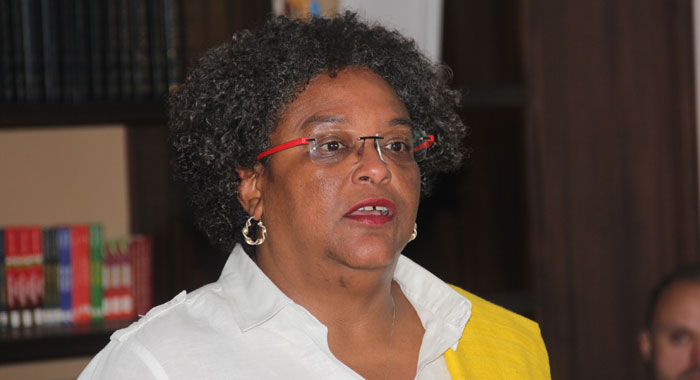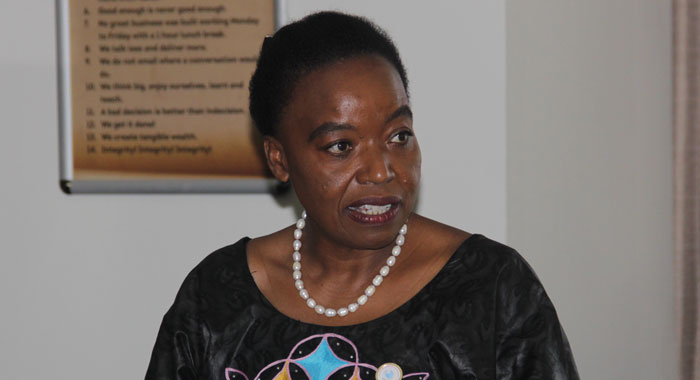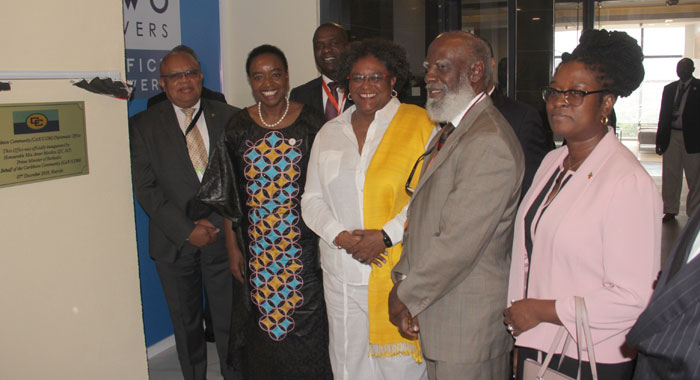By Kenton X. Chance
NAIROBI, Kenya (CMC) — The Caribbean Community (CARICOM), on Saturday, inaugurated it diplomatic office here, with Barbados Prime Minister Mia Mottley, saying it could become the most important contact between the 15-member bloc and the United Nations.
“I would like to suggest to those here that perhaps, more than any other location — more than Geneva, more than New York, the CARICOM representation in Nairobi, is going to be the one that is going to have the greatest impact in how our nations function, how we build, how we trade, how we deal with our food security, and, above all else, how we deal with our water security, because one of the more silent consequences of this climate crisis has been on our ground water supply across the region,” Mottley said.
Barbados Prime Minister Mia Mottley, centre, along with Monica K. Juma, cabinet secretary, Ministry of Foreign Affairs, Kenya, second left, and other CARICOM and Kenyan government officials at Saturday inauguration of the CARICOM Diplomatic Office in Nairobi. (CMC photo)
The United Nations Office at Nairobi is one of four major United Nations office sites where numerous different UN agencies have a joint presence. Nairobi is the global headquarters for two UN programmes — the UN Environmental Programme and the UN Human Settlements Programme.
Mottley said CARICOM needs technical support as well as the amplification of the financial development resources, noting the Warsaw Development Mechanism for Loss and Damage as a consequence of climate change.
The mechanism, created in 2013, acknowledges that “loss and damage associated with the adverse effects of climate change includes, and in some cases involves more than, that which can be reduced by adaptation”.
Mottley, however, said that the mechanism was “never given life or flesh, and, therefore, these are some of the real issues that we in the Caribbean Community have come to Nairobi to work and fight for on behalf of our people”.
For CARICOM, “this is not just an optional battle, this is the battle for our very survival as a region,” noting the historic nature of the opening of the diplomatic office here, Mottley said.
She said the event “carries with it a level of emotion that those who have gone before and who gave of their time, their blood, their energy to be able to have the fraternal embrace for a common fight for the betterment of the lives of our people after decades and, in some instances, centuries of exploitation would better appreciate the magnitude of the moment on which we meet today”.
Mottley said that the Caribbean and Africa have been separated not simply by the Atlantic Ocean but also by “centuries of division and exploitation”.
The ceremony here was also attended by Monica K. Juma, cabinet secretary, Ministry of Foreign Affairs, Kenya, Barbados’ Minister of Foreign Affairs, Jerome X Walcott, his Belizean counterpart, Wilfred Peter Elrington and other officials from CARICOM and Kenya.

Mottley said that CARICOM was adamant that it would not allow the separation between the region and Africa to continue any further.
“When we claim our Atlantic destiny, we are conscious that we are coming home, we are conscious that we are igniting the bonds that may have been sparked by our predecessors, in North Atlantic capitals, but borne out of common values and a common battle.
“But we believe that it is incumbent on our generation to move to the next level and that we have no one else to blame but ourselves if we do not remove the separation that was foisted upon us for centuries.”
Mottley said it is against that background that she was happy to welcome Kenya President Uhuru Kenyatta to Barbados in August and to agree, along with Secretary-General of CARICOM Irwin LaRocque, and chair of CARICOM, St. Lucia Prime Minister Allen Chastanet that establishing the diplomatic office “was a historic necessity”.
The Barbadian prime minister said that the inauguration of the diplomatic office was but one of the many steps in the next few months “that will communicate to our people as well as those who are watching from outside that this is not a fly-by-night relationship…
“This is one that is going to be anchored deeply and is intended to unleash the people-to-people communication and cooperation and the trade and investment opportunities such that our nations can prosper, relying on each other and not simply relying on those from the North Atlantic regions of the world”.
Mottley said she will in January take up officer as chair of CARICOM and that she intends to work with the Kenyan government to make real the first CARICOM-African summit that will help “to chart the destiny of our two regions in a way that is in our own deliberate interest and not that of any others”.
Mottley said that against that background, CARICOM hopes that in June, on the way to the Commonwealth Heads of Government Meeting in Rwanda, to put in place firm arrangements for the inaugural summit.
The Barbados prime minister said CARICOM and Kenya have seen opportunities for investments.
“We, therefore, believe that within CARICOM there is that capacity to be able to see to see how best, not just from Havana, where your ambassador is based, but also in the context of our presence here now in Nairobi, which for us is even more special because of the extent to which we can access the United Nations offices that are of perhaps greatest relevance the maturity of our Caribbean people at this point in time in a climate crisis.”
She said that for CARICOM, the message has been consistent:
“We are on the frontline of this climate crisis but it is war that we did not cause but it is one for which we are the first victims,” and that CARICOM, therefore, believes that the ability to have a presence there as a bloc, and hopefully a individual counties more and more
Mottley gave Bridgetown’s commitment that early next year, it will be in a position to “shape and influence the policy framework that is going to be foisted upon most of our countries with respect to how we live, how trade, and how we manage our environment in this very difficult time.”
The prime minister said she was very conscious that even as she speaks and refers to the Caribbean being on the frontline, Kenya has been experiencing unusual rains and floods that have cause tremendous dislocation and loss of life.
She said that for CARICOM and Kenya, the notion of climate refugees is a real thing.
“It is not speculative and, therefore, this office will portent far more than initially meets the eye,” Mottley said.

Speaking at the Saturday’s event, Juma commended CARICOM “for bending the arc of history” and congratulated the bloc for taking the decisive move to embrace Kenya, Africa and the United Nations fraternity in Nairobi.
“You have strong advocate in President Uhuru Kenyatta and you can be assured of Kenya’s solidarity,” the Kenyan official said, noting that Nairobi’s Afrocentric foreign policy orientation is unambiguous in its focus to strengthen relations within the continent and to reach out to the sixth region of Africa – the African diaspora.
“Under the stewardship of President Kenyatta, we will continue to forge stronger ties with people of African origin, both at bilateral level, we want to engage individual countries but also within the African Union at well as the multilateral framework.”
Juma said she looks to the CARICOM diplomatic office to “take up its role in building between our people who are bound by a common history, are bound by a common heritage to consciously forge our shared prosperity because, most importantly, we share a common destiny.”
She said she was honoured that the decision had come at the time of the celebration of the International Decade of People of African Descent, which runs 2015 to 2024.
“We welcome our brother and sisters to their home away from home…” Juma said.
The CARICOM diplomatic office was inaugurated at a time when the Africa, Caribbean and Pacific Group of States is holding its summit of Heads of State and Government from December 9 to 10 under the theme “A Transformed ACP: Committed to Multilateralism”.







Why are we joining with these people. They have no relationship with the Caribbean. They were not part of the Atlantic slave trade. We have nothing in common with them other than being black, so why.
Our ancestors came mainly from West Africa, but even they have little in common with us except the are black and they enslaved and sold our ancestors.
Why can’t we be happy being ourselves, why do we need people from such places. They have little to offer us financially so not much to beg or scrounge from them, eh! comrade. It will just be another expense.
Me hear dem say dat Dr Denzil Douglas – who was Prime Minister of Saint Kitts and Nevis for 20 years – was detained at England Gatwick Airport, by the UK Border Force three weeks ago. So dem say!
https://www.dailymail.co.uk/news/article-7768227/Ex-prime-minister-Saint-Kitts-held-Gatwick-Airport-trying-leave-Britain-70-000.html
Dem say dat “Officers seized the equivalent of more than £70,000 – in sterling, US dollars and eastern Caribbean dollars – from him on November 16 when he could not explain why he was attempting to leave the country with the cash” $ 249,161 XCD Dem recorded it as £70,000 ah British cash. But wait …….
Ah nah dis de same man dat did get cetch-up in de original Passport ting time back?
Today slavery is still very much a part of life in Africa, including in Kenya. In the Caribbean we are free. Why do we want to be friends of slavers and enslavers?
The global slavery index estimates that there are 188,800 people living in slavery in Kenya. Kenya is also a hotspot for human trafficking in the region, not only are an awful lot of people living in slavery in Kenya but there are also a lot of Kenyan people being trafficked in to slavery in other countries and people of other nationalities being trafficked through Kenya in to neighbouring countries. Kenya is still a dirty country where slavery is concerned. Are we considering buying slaves?
Human Rights under Kenyatta are abysmal. Lack of accountability for serious human rights violations, perpetrated largely by security forces, remains a major concern in 2018. The 2017 presidential election period saw abusive police operations in opposition strongholds, with police beating and shooting to death at least 100 opposition protesters and bystanders. Many women and girls were raped and sexually harassed by police during these operations.
A March 2018 peace deal between President Uhuru Kenyatta and main opposition leader, Raila Odinga, eased political tensions, but at time of writing, authorities had not taken any significant steps to ensure accountability for police brutality. Human rights abuse is out of control
Kenyatta on numerous occasions publicly promised to respect freedom of expression and media. However, the working environment for journalists and activists remains hostile. In 2017 and early 2018, police threatened journalists and bloggers, arrested and detained journalists, and shut down at least three television stations.
https://www.hrw.org/world-report/2019/country-chapters/kenya
The Kenyans want the Caribbean Nations via CARICOM to try and bring some credibility to a very nasty regime.
We are quite simply being used and Mrs Mottley has just had her brain enslaved.
With all due respect. To imply that Africans are to blame for the enslavement, genocide (of Africans) and the subsequent African-holocaust is ludicrous.